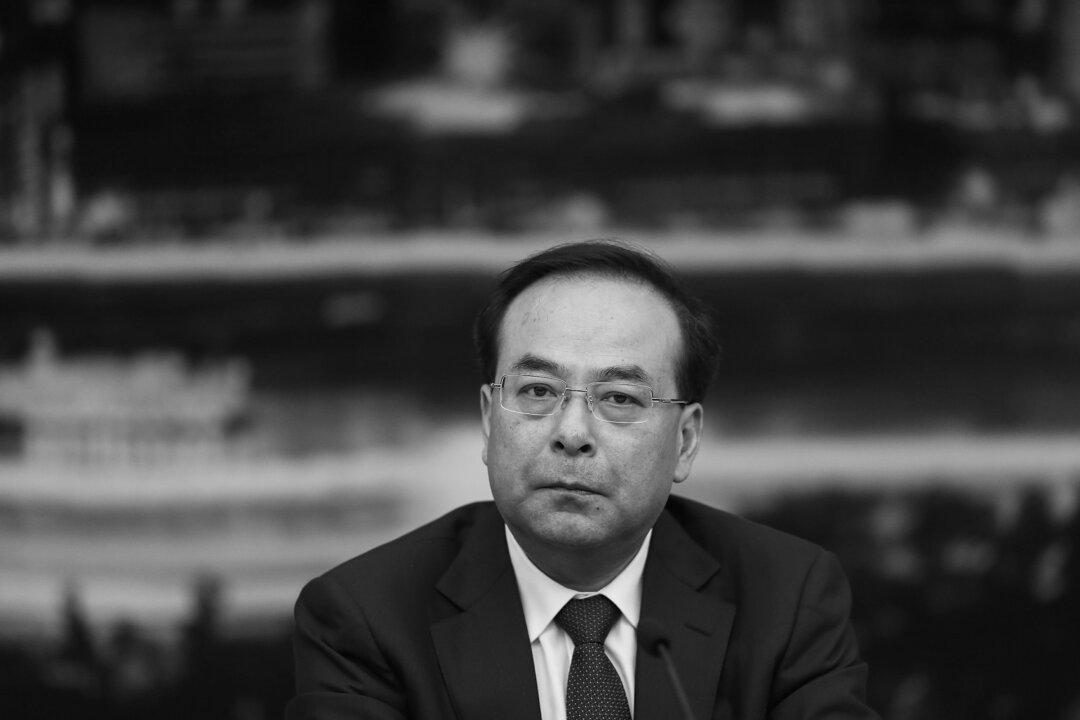Midway through 2017, the trajectory of high-ranking Chinese Communist Party official Sun Zhengcai suggested that he would have a bright future in the regime.
Sun ran the important commercial and industrial hub of Chongqing in southwestern China. At age 53, he was also one of the youngest members of the elite Politburo. Observers considered him to be a potential successor to Xi Jinping as leader of China.
But Chinese state-run media announced on the morning of July 15 that Sun had been removed from office. He did not appear on the evening broadcast when the new Chongqing boss, Chen Min'er, was introduced to city officials. Chinese and Western media reported that Sun was in Beijing for questioning.
On July 24, Sun was officially investigated for “severe violations of discipline,” a phrase that has come to mean corruption under the Xi leadership.
The abrupt dismissal of Sun, with only four months to go before a key political conclave this fall, is the latest demonstration of Xi’s current grasp of power, a hint at his political ambitions, and a flash of his determination to root out internal obstruction to his leadership.
Ultimately, Xi appears to be denying a rival political faction—helmed by former Party chief Jiang Zemin—its favored successor to the throne, while consolidating his own authority.
Compromised ‘Successor’
The Xi leadership and the faction led by Jiang have been embroiled in political warfare since Xi took office in late 2012. Two Jiang lieutenants, former Chongqing boss Bo Xilai and security czar Zhou Yongkang, had plotted a coup to replace Xi, who has alluded to the plot in several public speeches. Since the failed coup, Xi has purged many Jiang faction members and associates under a sweeping anti-corruption campaign.
Sun’s career biography shows that he was once the top aide to two Jiang allies, former Politburo Standing Committee member Jia Qinglin and ex-Beijing mayor Liu Qi. Sun was later appointed Party secretary of Jilin Province and Chongqing City, two regions where the Jiang faction is particularly influential.
Sun’s career path lends some credence to an essay on Vancouver-based Chinese news website Creaders.net that claims that Sun was acquainted with Jiang himself and was in fact being groomed to continue representing his faction’s interests at the apex of power.
Sun’s links with Jiang might suggest why informers inside the Chinese regime cite political indiscretion as the reason for his removal. For instance, one source told Reuters that Sun was being investigated for “violation of political discipline,” while another source said Chongqing officials were told during the meeting announcing Chen Min'er as the new Chongqing boss that Sun had made “political mistakes.” The sources spoke to Reuters on condition of anonymity as they were not authorized to speak to foreign media.
Further evidence of Sun’s political allegiances can be seen from the anti-corruption agency’s critique of Sun’s Chongqing administration in February. Sun’s administration hadn’t removed the “residue poison” of Bo Xilai and his right-hand man Wang Lijun, and had failed to curb corruption in local businesses and the bureaucracy, according to anti-corruption investigators.
While it is unclear if Sun is a card-carrying member of Jiang’s faction, his political career is effectively over with the announcement of a formal investigation on July 24.
Xi, on the other hand, appears to have strengthened his political position by keeping or promoting loyalists.
With the dismissal of Sun, the only other possible candidate for Chinese leader is Guangdong Party secretary Hu Chunhua. Hu’s political position seems secure for the moment because he is a protégé of former Chinese leader Hu Jintao (no relation to Hu Chunhua), and Hu Jintao seems to have been in a tacit alliance with Xi against the Jiang group.
Meanwhile, new Chongqing boss Chen Min'er worked with Xi when Xi was Party secretary of Zhejiang Province from 2002 to 2007. Chen’s promotion also allows Xi to stack the 25-member Politburo with loyalists at the Party’s upcoming 19th National Congress, because Chongqing chiefs usually sit on the Politburo.
Xi’s Political Ambitions
Around the time of Sun’s dismissal, state media started referring to Xi as “commander-in-chief” and “supreme leader” of the Chinese regime. Xi is already the regime’s “core” leader, a symbolically significant title that suggests Xi is, in theory, first among equals.
If Sun is later officially investigated for corruption, this would indicate an escalation of Xi’s anti-corruption campaign because he was an active Politburo member at the time of his dismissal. Only four sitting Politburo members have been expelled since 1990.
The fact that Xi made the arrest also indicates that he is confident in his ability to withstand pushback.
Surrounded by loyalists and with one less potential political rival to contend with, Xi seems to be paving the way to trying for a third term as Chinese leader in 2022—or something even beyond that.
A source close to Zhongnanhai, the headquarters of the Communist Party, told The Epoch Times that Sun’s removal is not merely Xi’s attempt to scare off rivals with a show of strength, but part of a broader power reorganization inside the Chinese Communist Party.




